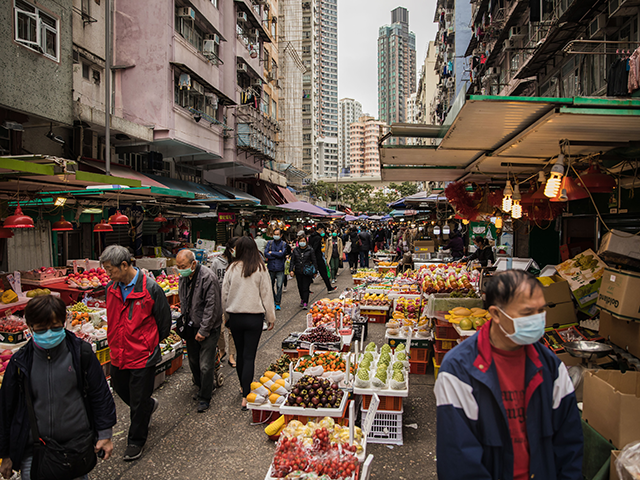China’s Minister of Agriculture Tang Renjian told journalists in a press conference Monday that the nation’s grain supplies “at times come under pressure” and Beijing needs to act to “stabilize” its food supply.
The remarks, couched in assurances that the Communist Party can guarantee enough food for its dwindling population despite “pressure,” follow a tenuous harvest season in 2020 severely affected by widespread floods affecting 27 of China’s 31 provinces and wiping out significant percentages of some of the nation’s most important crops. China has also faced significant shortages of pork, the nation’s most popular protein source, following a nationwide outbreak of African swine fever.
Food shortage fears appeared to prompt a national campaign against “food waste” that dictator Xi Jinping dubbed “Clean Plate” last year. The Communist Party proposed new regulations towards the end of 2020 limiting the amount of food that citizens could consume at weddings and other mass events and banned the alleged offending videos promoting overeating.
Tang insisted that China’s “rice bowl” would be secure through 2021 at his press conference, according to the state-run Global Times.
“He pointed out that the country’s grain output reached a record high of 669.5 billion kilograms in 2020 despite the global pandemic, adding that the country’s grain storage is sufficient,” the Times relayed. “However, Tang stressed that the country’s grain supply at times comes under pressure, saying that domestic demand of grain will continue to rise in the long run due to population growth.”
Tang reportedly urged the Communist Party, “we should stabilize domestic grain output and food supply.” The Global Times did not offer any specific recommendation from the agriculture and rural affairs minister on how to do so.
Tang’s press conference followed the publication of a report by his ministry on Sunday that the state news agency Xinhua described as “stressing the efforts to comprehensively push forward rural vitalization and accelerate the modernization of agriculture and rural areas.” The document revealed five-year goals to expand China’s agricultural territory and an emphasis on genetically modified crops to ensure supply.
“China will make the comprehensive advancement of rural vitalization a major task in realizing the great rejuvenation of the Chinese nation,” the document read in part, “and will speed up the modernization of agriculture and the countryside with the efforts of the whole Party and society.”
Xinhua’s summary of the agriculture plan did not mention the potential for renewed flooding or any plans to protect crop fields from natural disasters. While genetic modification does sometimes make crops less susceptible to pests, Xinhua also did not mention any contingency plans in the event of insect infestations causing significant damage.
Both floods and insects significantly limited China’s food supply in 2020. Flooding during the summer months affected an estimated 55 million people, according to the Chinese government, and 27 provinces. As of August 2020, China had lost $1.45 billion in property, including crops, to flood damage. Flooding also resulted in indirect damage to crops through limiting transportation. The destruction of major roads and bridges left large amounts of crops to rot in the farms that had managed to harvest anything.
Chinese state media also noted at the time locust and worm infestations had significantly damaged some crop fields that had survived the flooding.
Wheat crops reportedly suffered some of the most damage, alongside soybeans and corn – pivotal to the Chinese economy.
In August, dictator Xi Jinping delivered remarks calling Chinese people’s food waste “shocking and distressing” and announcing the “Clean Plate” program. Xi was cautious not to tie public pressure to eat less to food shortages caused by flooding but instead to blame social media.
“The initiative initially sparked speculation by some media over whether China is in a food crisis,” the Global Times observed at the time. “Experts say the world indeed faces a food shortage, but for China, the real threat to food security comes more from food wastage than epidemic or floods. ” The propaganda outlet declared any food shortage concerns regarding China “media hype.”
The “Clean Plate” campaign resulted in regulations to limit how much food Chinese citizens eat. In December, the National People’s Congress (NPC), the rubber-stamp communist legislature, introduced a bill that would limit how much food per guest organizers of weddings and other mass events could purchase.
“Catering service providers should adopt measures to minimize food waste, such as improving management systems for food purchase, storage and processing, and putting up posters to remind consumers to refrain from ordering excessive food,” the bill read in part. “It calls on catering service providers to use technologies such as big data to analyze the needs of consumers to better manage food purchases, transportation, and storage.”
The bill mandated that “individuals should serve or eat an appropriate amount of food at weddings, funerals, parties and other events.” The bill would also ban online videos showing people, typically thin women, overeating – a bizarre source of entertainment increasingly popular in China.
While boasting of “another bumper harvest” in 2020, the Global Times warned in December of yet another threat to the nation’s food supply: seed shortages.
“China needs to enhance the protection of seed quality resources and utilization, and enhance the construction of seed banks,” the newspaper reported, citing Chinese government-approved experts.
“The central government’s special emphasis on national food security does not mean China has a ‘food crisis,'” one of those “experts,” a pro-China blogger, told the outlet at the time.

COMMENTS
Please let us know if you're having issues with commenting.